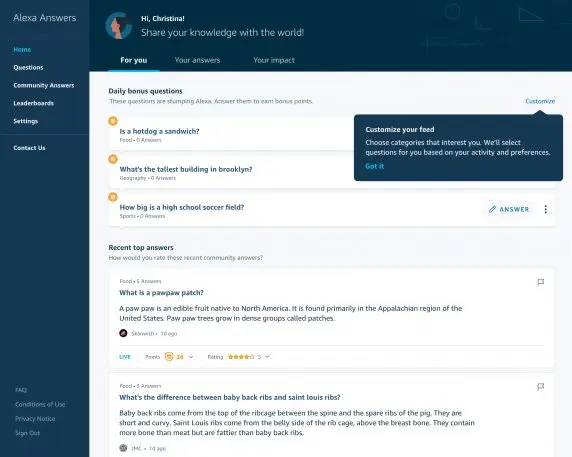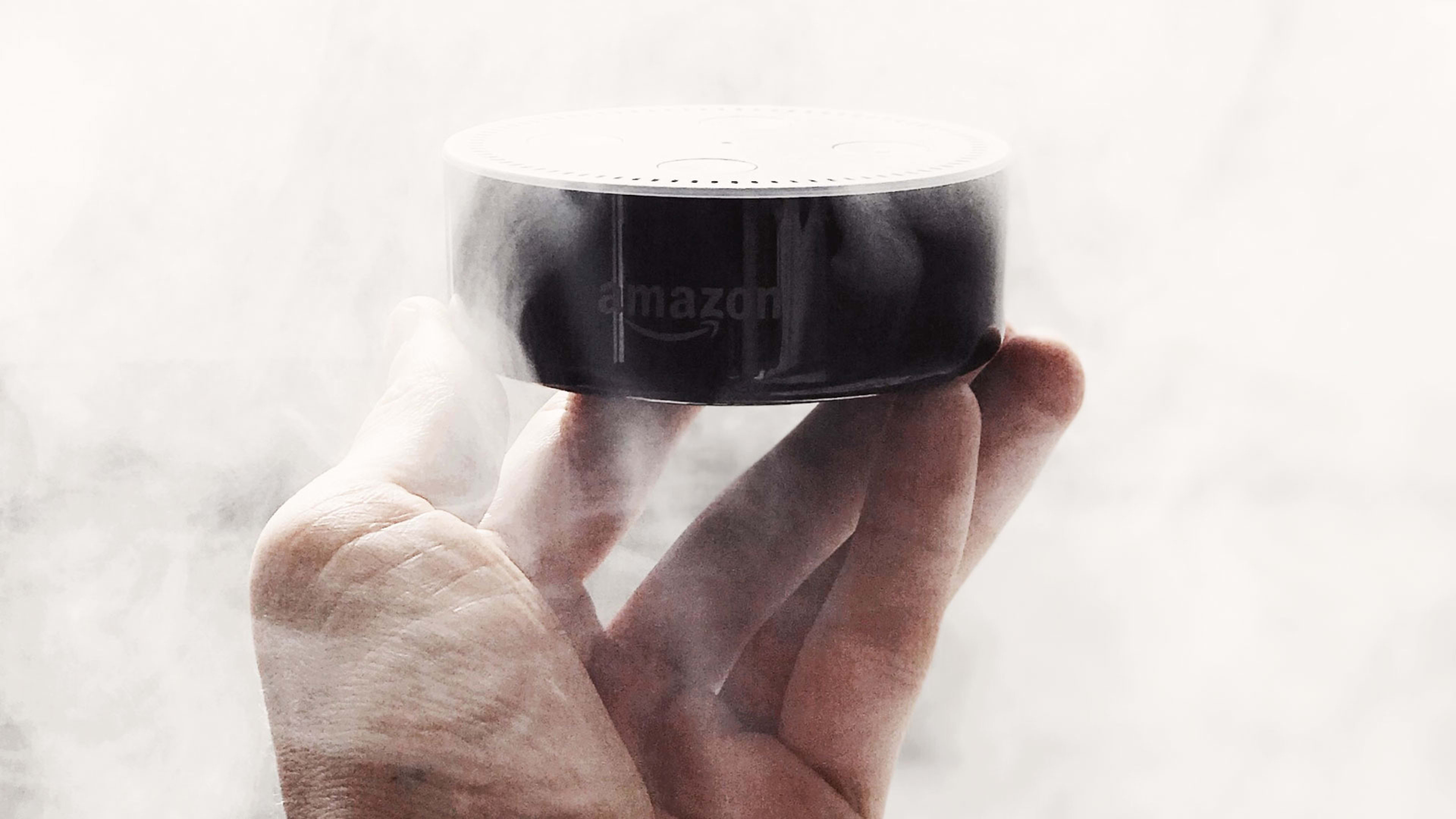The next time you ask a question to Amazon’s Alexa voice assistant, the answer might come from another Alexa user.
Starting today, Amazon is publicly launching a program called Alexa Answers, which lets anyone field questions asked by users for which Alexa doesn’t already have a response—ones such as:
- What states surround Illinois?
- What’s the proper amount of sleep?
- How many instruments does Stevie Wonder play?
- How much is in a handle of alcohol?
From then on, when people ask a question, Alexa will speak an answer generated through Alexa Answers, noting that the information is “according to an Amazon customer.”
The program launched in a private, invite-only beta for thousands of customers last year after a period of internal testing. Even with that limited group, Amazon says it’s already logged hundreds of thousands of responses, which Alexa has served millions of times. Those numbers will likely shoot upwards now that anyone in the United States can participate.
“Our North Star, our overall vision, is we’d love it if Alexa can answer any question people ask her, no matter what the language, where they are, what the device,” says Bill Barton, Amazon’s vice president of Alexa Information. “We’re focused on Alexa as an objective, factual information source with this particular effort.”
Search engine substitute
It’s not hard to see why Amazon might want to call in external help to deal with arcane questions. With the Google Assistant, Google can pluck answers to difficult questions from the billions of pages it’s indexed for its search engine. But Amazon has no comparably extensive corpus of material for Alexa queries. Instead, the company licenses data from hundreds of sources that it deems high-quality, and it uses more than a dozen question-and-answer techniques that it ranks according to a machine learning algorithm, which then determines the best response. (It’s a common misconception, Barton says, that Amazon uses Microsoft’s Bing search engine for answers; that partnership has been limited to supplemental items such as search links in the Alexa mobile app.)

Those who participate in Alexa Answers don’t submit responses directly through Alexa itself. Instead, Amazon provides a website where they can view pending queries and enter responses in 300 characters or less.
During the invite-only period, Amazon largely focused on making the answer process more engaging. It added a search function and more tags for users to filter different kinds of questions, and it launched a “for you” section that’s personalized for each contributor. Amazon has also tried to gamify the process of answering questions, adding profiles where users can see the impact of their responses, a leaderboard, and the ability to earn badges.
“We measure engagement through the website—Amazon’s very good at that, after decades of doing it—and we’re able to see our engagement go up as we add these fun, entertaining, and even game-like experiences for contributors,” says Barton.
Faith in the system
If you’ve been paying attention to giant tech platforms over the past few years, you might reasonably wonder if all of this can be abused and whether the information Amazon provides from customers will be trustworthy. As we’ve seen on platforms such as YouTube and Reddit, web communities can easily become overrun with trolls and other bad actors. Amazon itself has run into issues with fake reviews and occasional “review brigading” on its retail site. With Wikipedia having an ongoing vandalism problem, Alexa Answers would seem to run the risk of being poisoned with “answers” that are offensive or inaccurate. Even people with good intentions could supply incorrect information.

Nonetheless, Amazon is approaching Alexa Answers with what struck me as a surprising degree of optimism. The company is using automated filters to keep out obvious profanity, and it will also try to filter out questions with a political angle. (“We don’t want this to turn into a shrill forum for people who are into talking about whatever current political event or personality or that type of thing,” Barton says.) In some cases, human editors as well as algorithms will be involved in quality-control measures.
Beyond those safeguards, though, Amazon is hoping that a basic upvote and downvote system will help keep out low-quality responses. If a contributor receives too much negative feedback, Amazon may start providing fewer of that person’s responses to Alexa users, though even in that case, Barton says the company will stop short of banning a user outright. Amazon also won’t get into specifics on whether an answer must reach a certain number of upvotes before Alexa starts serving it.
“We’re leaning into the positive energy and good faith of the contributors, and we use machine learning and algorithms to weed out the noisy few, the bad few,” Barton says. “But we’re not going to suppress the magical experience we can give to 99 customers because one person had something different in mind.”
Amazon also isn’t requiring any kind of citation in its responses. That means Alexa Answers participants can’t easily check where information is coming from before upvoting it, and users will only hear “According to an Amazon customer” as the information source in Alexa’s responses. Barton says people just haven’t been asking for citations so far, but he believes a mass of voting across lots of users is a good enough signal for accuracy anyway.
“We’re certainly open to revisiting it if we get strong feedback from contributors or from end users if they find more attribution beneficial,” he says, “but in general what we find from our community is that they prefer crispness and conciseness in their responses.”
Alexa gets a community
Despite the potential for problems, Amazon is bullish on building up Alexa Answers. For one thing, Barton says, users can often respond to unanswered questions much faster than an automated system could, especially for breaking news. As an example, he notes that when Barbara Bush died in April 2018, Amazon saw a spike in questions about where she would be buried. Even within Amazon’s internal testing, the company got an answer and began serving it to users.
“We’ve seen cases where, in a very short period of time, you now have an answer because somebody in the community provided it,” Barton says.
But even if answers aren’t forthcoming, Amazon sees the creation of a community around Alexa as its own reward. Ultimately, it’s a way to get people involved and invested in the voice assistant, which in the long run might be just as valuable for Amazon as having an answer for what cork is made from or where the largest wind farm is located. It’s certainly a different approach than those pursued by the Google Assistant, Siri, and Cortana.
“We also believe that engaging a community in contributing to Alexa is on its own an important element of the Alexa experience,” Barton says. “Just the sheer act of people being able to contribute to Alexa, and having community content, is new for Alexa. There’s not yet another experience that allows for that as much.”
Recognize your brand’s excellence by applying to this year’s Brands That Matter Awards before the early-rate deadline, May 3.
